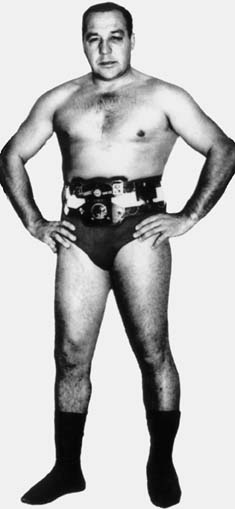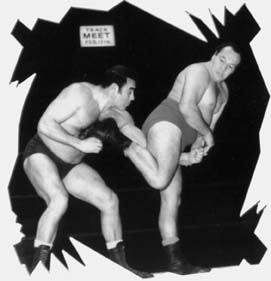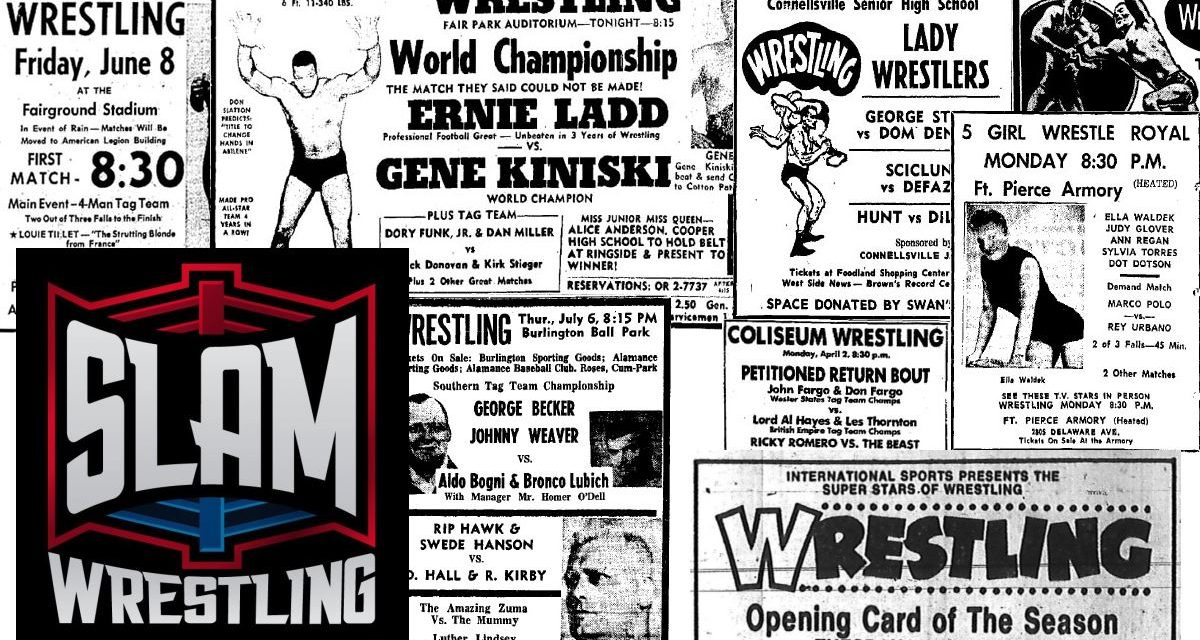BORN: 1932 in Old Cumnock, Ayrshire, Scotland
5’9″, 235 pounds; “I’ve a pair of shoulders that fill a door.”
AKA: Duncan McTavish, The Hangmen (with Vic Rossitani), Matt “The Guillotine” Gilmore
The horses kept Duncan McTavish on an even keel in the wild and crazy world of pro wrestling. It didn’t hurt in the publicity department either.

Duncan McTavish
While stationed in Vancouver as a mainstay for All-Star Wrestling, McTavish had a farm where he bred, raised and trained racehorses. “I’ve always been around horses. I have an affinity for them,” McTavish (Matt Gilmour) explained to SLAM! Wrestling.
“It was the horses that kept me sane, because my day was filled with animals and racing. It was exciting,” McTavish said. “[The promotion] got a lot of ink because I’d be racing horses that would be winning races. Then I’d rush over to the arena and wrestle, then rush back to Hastings Park. I was always on the move.”
“He got all kinds of publicity in the wrestling,” recalled All-Star Wrestling co-owner Gene Kiniski. “With his wrestling background, and being on TV so long, the fans were always recognizing him.”
Today, at age 73, McTavish given up working on his southern Ontario farm and is in the process of divesting himself of his last few racehorses. He still works a bit with his two sons, who run a trailer business, and is planning a move back to Scotland, or even Mexico. Regardless of where he ends up, it’s important this his family — two sons and a daughter — stay near.
His health has been an issue over the last few years, but it hasn’t dampened his sense of humour. McTavish had a heart valve replaced last year and it’s acting up again. Doctors put a pig’s valve in. “The only thing I noticed different was that every time I saw a bunch of pigs in a swill hole, I wanted to jump in!” No longer able to drive, he is facing another operation.
Yet McTavish is more than happy to talk about his 29 years as a pro wrestler. In fact, though he says he wouldn’t do it again, it’s pretty clear that wrestling brought a lot of fun, memorable experiences to his life.
Born in Scotland in 1932 to a father who was a bus driver, and a mother who had worked in munitions, McTavish toiled in a coal mine as a teen. The family had relatives in Canada and decided to make the move. “My parents, God bless them, they realized that the only way that my brother, sister and I would get ahead in this world would be if we came out of where we were. Everybody was dirt poor. It was during the war that we were brought up,” McTavish said. “We came to Canada so that we could have a better life … They still had to work. They were at the age where they had to uproot themselves from all their friends.”
The Gilmours settled in Hamilton, Ontario, and McTavish played competitive soccer and worked at LifeSavers candy company. He then enlisted in Princess Patricia’s Canadian Light Infantry, and served in the Korean War. He was shot a couple of times, and some of the memories still haunt him. “It’s a very tragic thing for me to visit the Korean War Memorial on Mavis Drive at the cemetery there, and see my friends, 22, 21, for what?” He was with the intelligence section, and saw one friend killed Christmas Eve.
When his five-year stint in the army ended, he was at loose ends. Deciding to capitalize on his boxing skills, McTavish went to Wentworth’s gym in Hamilton, run by former wrestler Jack Wentworth (Jack Hodgson). It was a regular hangout for area pro wrestlers like Jack Hill (later Jerry Valiant, Guy ‘Stomper’ Mitchell, etc.), George Momberg (aka Killer Karl Krupp) and Lloyd Morris.
“I was at the gym training and Jack [Wentworth] said, ‘Well, come on in the ring.’ They were going to stretch me from one to the other,” McTavish explained. “But they didn’t manage to do it, so I became quite a natural. I’ve never really had to think about it. I didn’t have to think about getting out of a hold, or getting into it. It was an automatic thing. I went from there, and Jack took me under his wing. I wound up going over to Detroit with Bert Ruby.”
His first big break came when he got the call to go into Northern Ontario for Larry Kasaboski, where he worked under his real name, Matt Gilmour (usually spelled Gilmore), and under a mask as a Hangman with Vic Rossitani. “You learned every night,” he said. “Larry was never the best payer in the world, but we would up going up with Larry for a while.” Among the grapplers he remembers on tour were Sweet Daddy Siki, and Terry and Ronnie Garvin.
In fact, a bout against Ronnie Garvin is a likely contender for the longest pro match in Canadian history. They were fighting at the Farris Arena outside North Bay, and they battled for 2 hours and 10 minutes in a Texas Death Match. “We were out in the parking lot and the people were coming to see the wrestling because Pete Henley, who used to do news, he used to give the wrestling results. He couldn’t get the main event since it was still going on, so people were coming down to the Farris Arena at that time. Larry Kasaboski happened to be in Montreal and he called the booker, who was Terry Garvin, and asked Terry how the main event went. Terry said, ‘I don’t know, they’re still doing it!’ That was a record that night.”
The historical ties between Kasaboski’s summer tour and Quebec got Gilmour into La Belle Province. He was Matt “The Guillotine” Gilmour, often teaming with Bob Paris.
“Because I was a bump man, I got over really well with [Edouard] Carpentier, and the Rougeaus,” he said. In Quebec, he’d team with legends like Hans Schmidt and even “Nature Boy” Buddy Rogers. A boxing match against Jacques Rougeau Sr. stands out. “He didn’t know it was a work and knocked me out! That makes it interesting.” On another occasion, he had his arm broken by a chain during a riot in Eastern Quebec.
Pedro Martinez in Buffalo brought him in, and Gilmour briefly became a “cousin” of the famed Gallagher Brothers, Doc and Mike. “Pedro needed a another Gallagher brother because Mike could take a bump forward and I could take a bump backward. So they needed a cousin and I became a cousin for the Gallagher Brothers,” he said with a laugh.
After a stint booked out of Utah, that included brief visits to Arizona and California, Gilmour made his way to Vancouver where All-Star Wrestling co-owner Sandor Kovacs dubbed him Duncan McTavish. The idea, said McTavish, was to capitalize both on his own background, but also the heavy British element that existed in British Columbia. It worked out very well
According to Kiniski, McTavish was “pretty well a main eventer, or a semi-wind-up” during his run in Vancouver. “He had the gimmick, the bagpipes and all that stuff. He had that Scottish brogue. He was just a little different, a world traveler. He was very easy to market.”

Duncan McTavish mule kicks Chris Tolos
Kiniski and McTavish remain friends today, reunited a few years ago at Duncan’s farm for the great Wrestling With The Past TV series. “We did an awful lot of hour draws out west. He’d come by me the next day and say ‘Look what you did to me last night.’ There was this mutual respect for one another,” explained McTavish. “When you can hold their attention, like Kiniski and I could for an hour, and that was without fighting in the crowd or anything. It was with what you were doing in the ring, and it wasn’t sequences, it was just plain hard work.”
McTavish was Pacific Coast tag team champion with Don Leo Jonathan. “That’s got to be the end all that him and I were tag team partners. You talk about Mutt and Jeff!” laughed the 5-foot-9 McTavish, before telling a story about the 6-foot-6 Jonathon. “When we were working for the tag team championship out in B.C., he got thrown out of the ring. I ended up pinning whomever it was. I come out, and you know Don Leo was pretty tall and gangly. So he’s getting up off the floor and some little Italian jumped up and kissed him on the mouth. I said, ‘Come on Leo, you and I are sweethearts, let’s go home.’ I never forgot that — the look on Don Leo’s face when the guy kissed him. These are the kind of memories that you keep.”
It wasn’t until he found success in Vancouver that the door was opened in Toronto. “There seemed to be a certain clique and if you weren’t in that clique, you weren’t going nowhere,” he said of the Frank Tunney office. “It was such a shame that everybody had to go elsewhere before they could come back. I’d done a lot of jobs on television for CH [television home of Maple Leaf Wrestling], yet when I was out west as Duncan McTavish and going on TV there, then they brought me in to wrestle The Sheik in the main event in Maple Leaf Gardens.”
Revenge, as the say, can be sweet. “Pat Flanagan was the booker in Toronto for a while. Pat, he saw me one day. ‘Ah, you’re too small. You’ll never make a wrestler.’ I was up in Quebec, and they flew Pat in and he had to do a job for me. I couldn’t resist saying, as I pinned him, ‘Not bad for a small guy.'”
After his stint out west ended, McTavish settled back in Ontario, and worked on a regular basis for “The Bearman” Dave McKigney. Of course, that brings up bear stories (and the time he wrestled a tiger in Oregon — “Actually, they’re just like big pussycats. You do most of the work.”)
One of McKigney’s bears, Gentle Ben, lived at his farm in Schomberg. “Once the Bearman’s wife got killed, I thought he’d never have another bear. He brought the one out to our place out there. I don’t know what happened. He was tied to his traveling cage. Myself and another person walked by, and I don’t know what made me turn around, but that sucker was coming for me. He knocked me down and I had a bite mark on me you wouldn’t believe for a long time. I got him up. He ran in the cage and I went in the cage after him and beat the hell out of him. Every time he heard my voice after that, he would try to get away. Nobody wanted to work with me, I was too tight!”
Later, the same bear went out to the Maritimes with The Bearman and bit a couple of people’s fingers off. Clyde Gray was the Ontario Athletics Commissioner and refused to let the bear wrestle in Ontario. “[McKigney] was at my place when I said to him and my son, ‘I want you to go down to Queen’s Park to talk to Monte Quinter. Take the bear with you but don’t take him out of the cage, just leave him in there.’ So they left him in there. In the meantime, I called Monte Quinter’s office and he said he couldn’t do nothing about the bear being reinstated because it was before the courts. I said, ‘Well, it’s a simple solution. The Bearman can’t earn a living if he doesn’t wrestle the bear. If the bear can’t wrestle, then the Bearman can’t feed him. And if he can’t feed him, he’s going to shoot the bear on the city hall steps.’ Then I called the radio and TV stations. He made more money with the bear that year than if he had have wrestled him! When my son and the Bearman got down there, they arrested them and put them in the cell under Queen’s Park, but they hadn’t done nothing. They were just there. The bear was allowed to travel in the cage. They didn’t take it out.”
McTavish was in Halifax when he decided to call it quits. Some punk in the audience had asked him why an old man like him was in the ring, so McTavish chased him and dragged him down some stairs. Later, during his match, the insult didn’t go away. “I’m thinking, ‘what’s an old man like me doing up on the ropes trying to dropkick some young kid. … I didn’t want to push it too much longer, and my body was in fairly good shape, other than my heart.”
Besides working on the farm with his horses, he also promoted country and western shows; “I’m really interested in Canadian talent. I promote a group called Gerry and the Coasters, they’re from down east. One of the girls I used to promote, Kelly Vaughn, she’s now in Las Vegas. I want to help them. I don’t want to make any money off them.”
“Money has never been a driving fact for me,” he continued. “Happiness is more important to me. And being with my family is more important than anything else.”
Yes, there are regrets today for McTavish, but not bitterness. “When you start to add it up, it’s a lot of abuse on your body. But it allowed me, a little guy from Scotland, to go all around to places I would never have been able to afford, to meet men like Joe Louis and Cassius Clay and Lou Thesz and Buddy Rogers — people that you hear of — allowed me to be with them. That would never have happened if it wasn’t for the wrestling.”
RELATED LINKS
- June 6, 2011: Duncan McTavish dead at 80
- Sep. 18, 2007: Dinner/dance kicks off Hamilton Wall of Fame

